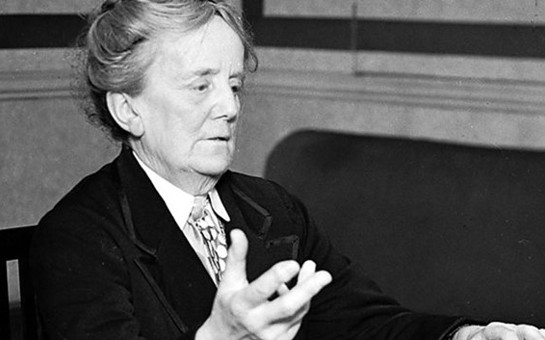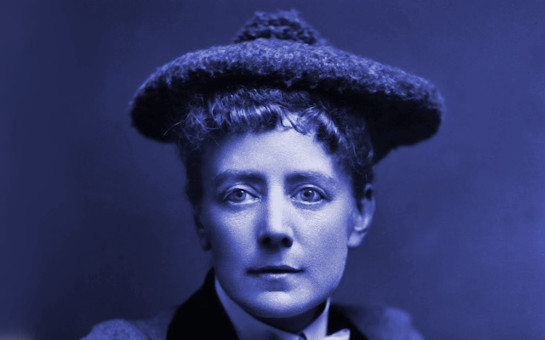Ethel Smyth
1858 - 1944
British
Summary
In 1890 Smyth returned to England, making her debut as a composer of orchestral music with a Serenade in D at the Crystal Palace Concerts, while her Mass in D (1893) brought her wide public recognition. Smyth went on to write six operas between 1892 and 1924, performed at leading houses including Weimar, Leipzig, Covent Garden and The Met. Smyth was made a Dame Commander of the Order of the British Empire (DBE) in 1922, becoming the first female composer to be awarded a damehood.
Biography
Dame Ethel Mary Smyth attained prominence as one of the most accomplished female composers in a male dominated environment, and as one of the main representatives of the suffragette movement.
Smyth was born to a wealthy bourgeois family, daughter of Major-General John Hall Smyth and Emma Struth Smyth. Against her father’s wishes she decided to pursue a musical career. In 1887 Smyth entered the Leipzig Conservatory, staying for one year only after becoming disenchanted with the tuition and staff. Remaining in Leipzig, Smyth then took harmony and counterpoint lessons with Heinrich von Herzogenberg. During this period she met many of the most significant composers of the day, including Johannes Brahms, Antonín Dvořák, Clara Schummann and Pyotr Tchaikovsky. The latter was especially encouraging, describing Smyth in his memoirs as ‘one of the few women composers whom one can seriously consider to be achieving something valuable in the field of musical creation’.
Over the following decade Smyth lived and worked in several countries around Europe, gaining a breadth of experience that invested her compositions with a distinctly European character. In 1882 while in Florence, she met French American philosopher and poet Henry B. Brewster (1850–1908), who would become one of her closest friends and collaborators.
In 1890 Smyth returned to England, making her debut as a composer of orchestral music with a Serenade in D at the Crystal Palace Concerts, while her Mass in D (1893) brought her wide public recognition.From 1893 to 1910, Smyth focused much of her creative energies on composing a series of operas, which were performed with some success in Europe and North America – a considerable achievement for a female composer at that time. In 1898, her first opera Fantasio was first performed in Weimar. Four years later, Der Wald was heard first in Berlin and then at the Royal Opera House in London. Der Standrecht was performed in Leipzig and Prague in 1906 before being performed in English translation as The Wreckers in London under the baton of Thomas Beecham in 1909. However, for each of these works Smyth had to work tirelessly to obtain performances.
From 1911 to 1913 Smyth was closely involved with the English suffragette movement led by Emmeline Pankhurst (1858–1928). One of her compositions, The March of Women, was adopted as the anthem to The Women's Social and Political Union (WSPU).She was one of more than 100 feminists arrested for breaking windows in March 1912, for which she served two months in Holloway Prison. When her friend Thomas Beecham paid her a visit, he found her directing a memorable performance of The March of the Women, sung by fellow suffragettes.
During the First World War the suffragette movement suspended its activities and Smyth worked as an assistant radiologist in a French military hospital in Vichy from 1915 to 1918. These years were particularly difficult as she became increasingly deaf. She then concentrated much of her efforts on writing, becoming a prolific author of memoirs. The first of a total of eight volumes, entitled Impressions That Remained, appeared in 1919.This last period of Smyth's life also saw her receive several notable accolades, in recognition of her achievements as a composer. In 1922, she was appointed D.B.E. for services to music, becoming known as Dame Ethel Smyth. She was also the recipient honorary degrees from the universities of St. Andrews (1928) and Manchester (1930), while in 1926 she became the first female recipient of an honorary doctorate in music from Oxford University.
Reproduced with permission of the British Library; please contact for reproduction.
Find out more about Ethel Smyth at www.bl.uk/people/ethel-smyth
Smyth was born to a wealthy bourgeois family, daughter of Major-General John Hall Smyth and Emma Struth Smyth. Against her father’s wishes she decided to pursue a musical career. In 1887 Smyth entered the Leipzig Conservatory, staying for one year only after becoming disenchanted with the tuition and staff. Remaining in Leipzig, Smyth then took harmony and counterpoint lessons with Heinrich von Herzogenberg. During this period she met many of the most significant composers of the day, including Johannes Brahms, Antonín Dvořák, Clara Schummann and Pyotr Tchaikovsky. The latter was especially encouraging, describing Smyth in his memoirs as ‘one of the few women composers whom one can seriously consider to be achieving something valuable in the field of musical creation’.
Over the following decade Smyth lived and worked in several countries around Europe, gaining a breadth of experience that invested her compositions with a distinctly European character. In 1882 while in Florence, she met French American philosopher and poet Henry B. Brewster (1850–1908), who would become one of her closest friends and collaborators.
In 1890 Smyth returned to England, making her debut as a composer of orchestral music with a Serenade in D at the Crystal Palace Concerts, while her Mass in D (1893) brought her wide public recognition.From 1893 to 1910, Smyth focused much of her creative energies on composing a series of operas, which were performed with some success in Europe and North America – a considerable achievement for a female composer at that time. In 1898, her first opera Fantasio was first performed in Weimar. Four years later, Der Wald was heard first in Berlin and then at the Royal Opera House in London. Der Standrecht was performed in Leipzig and Prague in 1906 before being performed in English translation as The Wreckers in London under the baton of Thomas Beecham in 1909. However, for each of these works Smyth had to work tirelessly to obtain performances.
From 1911 to 1913 Smyth was closely involved with the English suffragette movement led by Emmeline Pankhurst (1858–1928). One of her compositions, The March of Women, was adopted as the anthem to The Women's Social and Political Union (WSPU).She was one of more than 100 feminists arrested for breaking windows in March 1912, for which she served two months in Holloway Prison. When her friend Thomas Beecham paid her a visit, he found her directing a memorable performance of The March of the Women, sung by fellow suffragettes.
During the First World War the suffragette movement suspended its activities and Smyth worked as an assistant radiologist in a French military hospital in Vichy from 1915 to 1918. These years were particularly difficult as she became increasingly deaf. She then concentrated much of her efforts on writing, becoming a prolific author of memoirs. The first of a total of eight volumes, entitled Impressions That Remained, appeared in 1919.This last period of Smyth's life also saw her receive several notable accolades, in recognition of her achievements as a composer. In 1922, she was appointed D.B.E. for services to music, becoming known as Dame Ethel Smyth. She was also the recipient honorary degrees from the universities of St. Andrews (1928) and Manchester (1930), while in 1926 she became the first female recipient of an honorary doctorate in music from Oxford University.
Reproduced with permission of the British Library; please contact for reproduction.
Find out more about Ethel Smyth at www.bl.uk/people/ethel-smyth
News

- Suffrage and Song in Sydney
- 10th October 2024
- Suffrage and Song in Sydney

- BBC Proms 2022: Premieres and performances
- 26th April 2022
- There is nothing in the world quite like the BBC Proms. 2022 is no exception with a host of Wise Music Classical new commissions and notable performances.

- Wise Music Group at the 63rd GRAMMY Awards
- 22nd March 2021
- Wise Music Group is delighted to announce that several commercial recordings we are associated with through our writers have garnered awards at this year’s 63rd GRAMMY Awards. With six awards in total, we are...

- International Women's Day 2021
- 10th February 2021
- In celebration of International Women’s Day on Monday 8 and Women’s History Month all this March we are highlighting some of our composers recent and up-coming concerts and latest released recordings. We...

- Wise Music Classical Composers Share in the GRAMMY Nominations
- 25th November 2020
- The 63rd annual Grammy Awards ceremony will be held on Sunday January 31, 2021, in Los Angeles, CA. Along with the recording artists, several composers and works published or represented by Wise Music Group are on...

- Premiere Recording of Dame Ethel Smyth's 'The Prison'
- 10th August 2020
- There is much that is striking, from the way in which Smyth draws in the scene around the prisoner's voice at the very start, to the hint of a solemn Bach chorus at the end of the first half, and the echoing Last Post...
Performances
20th April 2025
- PERFORMERS
- Pfarrei Bruder Klaus Bern
- CONDUCTOR
- Matthias Behrends; Nikolina Pinko-Behrends
- LOCATION
- Kirche Bruder Klaus, Bern, Switzerland
3rd May 2025
- PERFORMERS
- Chorus of Westerly
- CONDUCTOR
- Andrew Howell
- LOCATION
- George Kent Performance Hall, Westerly, RI, United States of America
4th May 2025
- PERFORMERS
- Chorus of Westerly
- CONDUCTOR
- Andrew Howell
- LOCATION
- George Kent Performance Hall, Westerly, RI, United States of America
7th May 2025
- SOLOISTS
- Liv Migdal, violin; Tillmann Höfs, horn
- PERFORMERS
- Sinfonieorchester Münster
- CONDUCTOR
- Alexander Merzyn
- LOCATION
- Theater, Münster, Germany
8th May 2025
- SOLOISTS
- Liv Migdal, violin; Tillmann Höfs, horn
- PERFORMERS
- Sinfonieorchester Münster
- CONDUCTOR
- Alexander Merzyn
- LOCATION
- Theater, Münster, Germany
Features

- Celebrating Women Composers
- Join Wise Music Group in celebrating the works of our female composers with this new brochure for 2024

- International Women's Day 2020
- This International Women’s Day, we have released an update of our Celebrating Women Composers: A Timeline interactive brochure. Read the feature to find out more.
Photos

Discography
- LabelChandos
- Catalogue NumberCHAN 5279
- ConductorJames Blachly
- EnsembleExperiential Orchestra and Chorus
- SoloistDashon Burton, bass-baritone; Sarah Brailey, soprano
- Released7th August 2020
- Works
The Prison

1/1
